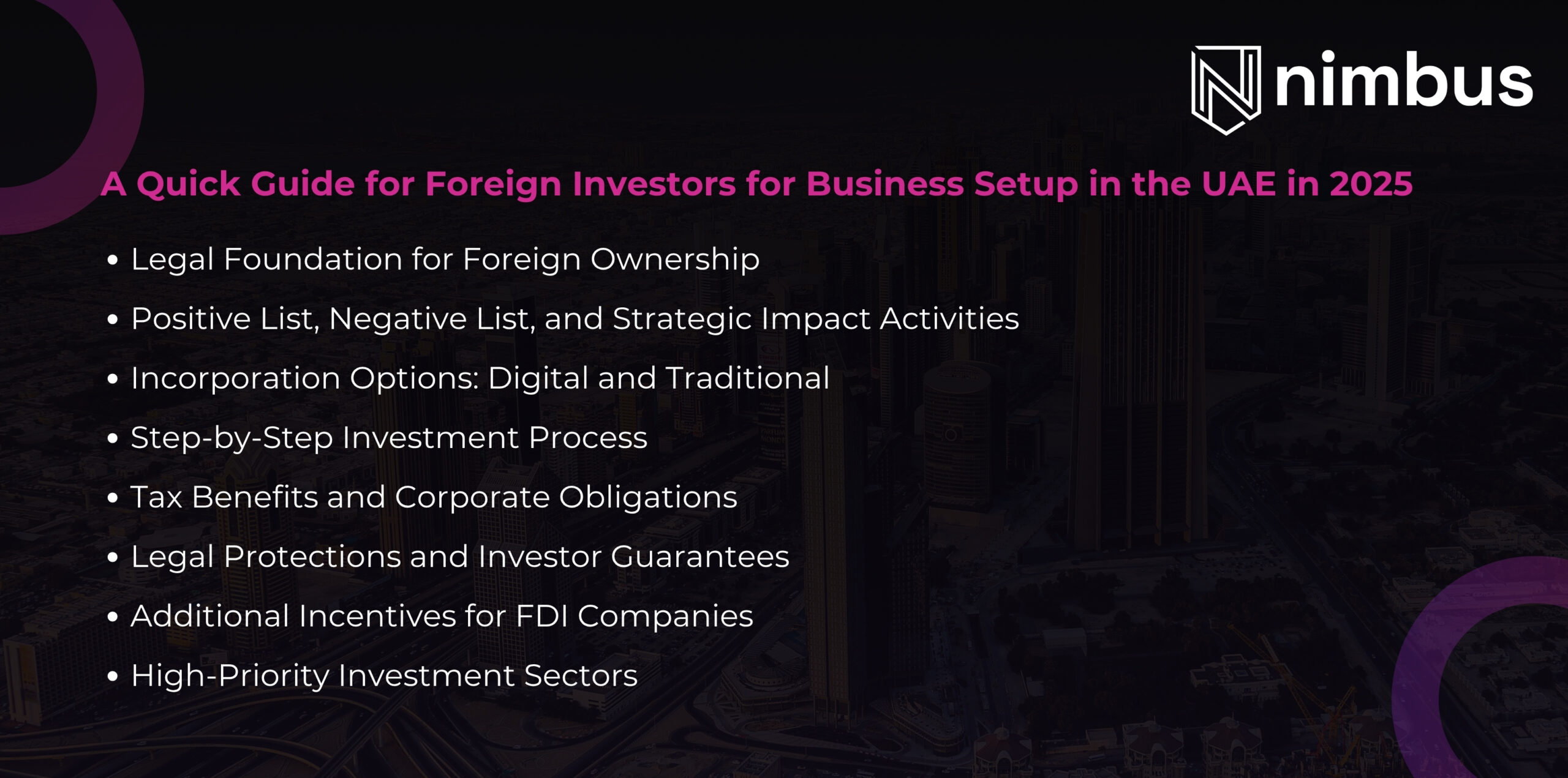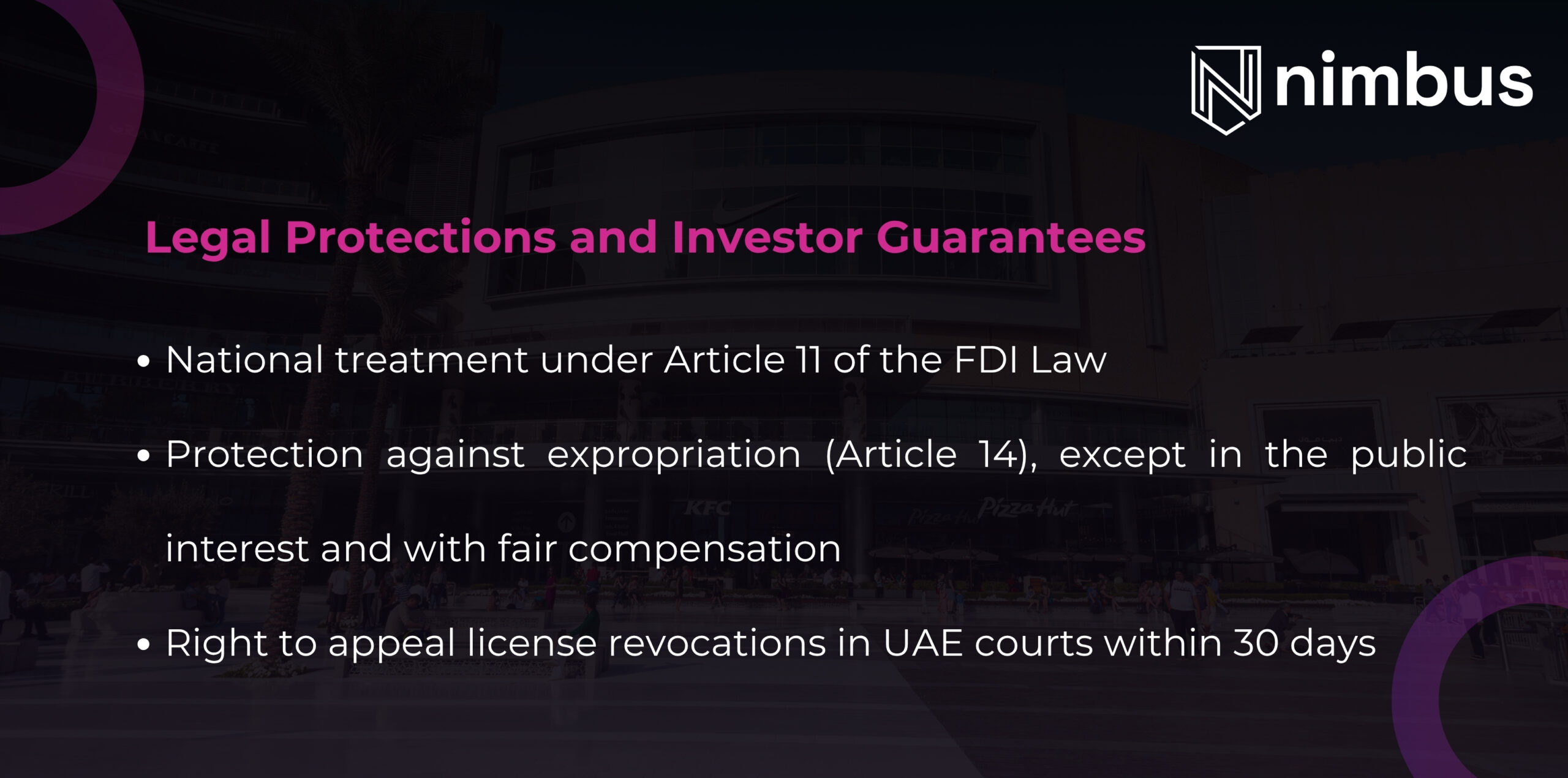The UAE continues to solidify its status as a global destination for foreign direct investment (FDI), thanks to its investor-friendly regulations, competitive tax regime, and a clear licensing path.
With nearly US$30.7 billion in FDI inflows recorded in 2023, the country ranked second globally, accounting for over 47 percent of regional inflows, according to the UNCTAD World Investment Report 2024.
This blog post explores the updated investment procedures for foreign entrepreneurs in 2025, the legal framework supporting full foreign ownership, and practical steps for business setup in the UAE under its evolving commercial landscape.
A Quick Guide for Foreign Investors for Business Setup in the UAE in 2025

1. Legal Foundation for Foreign Ownership
Foreign investors in the UAE can own 100 percent of companies operating in most sectors, thanks to Federal Decree-Law No. 26 of 2020, which modernized the Commercial Companies Law. This law works in conjunction with the FDI Law of 2018 and Cabinet Decision No. 16 of 2020.
These legal reforms abolished the requirement for Emirati partners in many commercial activities while preserving a Negative List of restricted sectors and defining strategic-impact activities that may still require local equity or approvals.
2. Positive List, Negative List, and Strategic Impact Activities
The Positive List includes sectors where foreign ownership is fully allowed upon meeting and fulfilling the Department of Economic Development (DED) procedures:
- Agriculture
- Manufacturing
- Information and communications
- Hospitality and food services
- Healthcare and education
- Science and technology
- Art, entertainment, and construct
Sectors on the Negative List remain closed or regulated under special conditions. These include:
- Petroleum exploration and production
- Banking and financial services
- Insurance
- Postal and telecom services
- Air and ground transportation
Strategic-impact sectors lie in between and require additional approvals from federal regulators. Examples include defense-related industries and telecoms.
3. Incorporation Options: Digital and Traditional
Foreign investors can register businesses either via the federal Basher platform or through traditional DED service centers. Basher offers a fully digital path where trade name, initial approval, and commercial licensing can be completed in minutes.
Traditional registration may be more suitable when the investment involves land leases, construction, or requires clearances from multiple authorities.
4. Step-by-Step Investment Process
- Identify the business activity on the Positive List.
- Select the legal form (LLC, sole proprietorship, or private joint-stock company).
- Confirm capital requirements. Minimum share capital varies depending on the activity and must be divided into units of at least AED 1.
- Prepare a feasibility study and draft memorandum of association (MoA).
- Reserve a trade name. It must reflect the business activity and end with “Foreign Direct Investment (FDI).”
- File for initial approval with DED, including:
- Copies of passports or Emirates IDs
- Draft articles of incorporation
- Any required regulatory approvals (e.g., Ministry of Health for clinics)
- Clearance from the General Directorate of Residency and Foreigners Affairs
- Secure a physical lease. Municipality zoning laws will apply.
- Submit the final license application with signed documents.
- Await approval. DED must decide within five business days of receiving complete documents.
- Open a local bank account and deposit 20 percent of declared capital.
- Complete capital injection within two years, certified by auditors.
- Register with:
- Ministry of Economy
- Chamber of Commerce
- Notify DED when operations begin.
Branch offices follow a similar process but require board resolutions, parent company documents, and NOC from the current sponsor if the manager resides in the UAE.
5. Tax Benefits and Corporate Obligations
As of 2025, UAE corporate tax rates are:
- 0 percent for the first AED 375,000 (US$102,109.7) in profits
- 9 percent on profits above that threshold
There are no withholding taxes on dividends, interest, or royalties. All companies must register with the Federal Tax Authority and file returns within nine months of their financial year-end. Other key corporate considerations:
- A single individual or legal entity may fully own an LLC.
- Emirati participation is not required unless specified for strategic-impact sectors.
- Confidentiality of all technical and financial submissions is legally protected.
6. Legal Protections and Investor Guarantees
FDI companies enjoy several legal protections:

- National treatment under Article 11 of the FDI Law
- Protection against expropriation (Article 14), except in the public interest and with fair compensation
- Right to appeal license revocations in UAE courts within 30 days
7. Additional Incentives for FDI Companies
Beyond the legal framework, FDI investors benefit from initiatives like NextGenFDI, which supports tech companies through:
- Fast-tracked visas
- Subsidized office space
- Business onboarding assistance
Profits, liquidation proceeds, and salaries can be freely repatriated. Commercial information submitted during licensing is treated confidentially.
8. High-Priority Investment Sectors
The UAE Ministry of Economy identifies 16 strategic sectors for FDI focus. These sectors benefit from freezone incentives and federal accelerators. Here are the major investment sectors.
- Fintech
- E-commerce
- Agritech
- Health care
- Education
- Tourism and medical tourism
- Renewable energy
- Information and communications technology
- Manufacturing
- Logistics and smart city solutions
- Media and entertainment
- Space
- Gaming and creative industries
Why the UAE Remains a Prime FDI Destination?
The UAE offers a clearly defined path for foreign investors and company formation. Coupled with national treatment, tax advantages, and robust legal safeguards, the UAE remains one of the world’s most attractive investment destinations.
For global investors seeking a secure, opportunity-rich environment, the UAE offers both clarity and competitiveness in 2025 and beyond.



